Wheelchair Travel in Berlin
Overview
![]() Wheelchair travel in Berlin is best done using taxis and the accessible busses. There are also many subway stations with elevators to get to the platforms which provide a good option for wheelchair travel in Berlin. There is a website to check which stations have elevators that are out of service.
Wheelchair travel in Berlin is best done using taxis and the accessible busses. There are also many subway stations with elevators to get to the platforms which provide a good option for wheelchair travel in Berlin. There is a website to check which stations have elevators that are out of service.
I recommend using taxis to get between the tourist areas in East Berlin: Checkpoint Charlie area, Museum Island, the Reichstag, Gemäldegalerie area, and the Jewish Museum. You can walk/roll to the sights within each of those areas:
– Checkpoint Charlie area: Museum of the Wall and Topography of Terror
– Museum Island: German History Museum, Pergamon Museum, Berlin Cathedral, and Egyptian Museum
– Reichstag area: Reichstag, Brandenburg gate, Memorial to the Murdered Jews of Europe
– Gemäldegalerie area: Gemäldegalerie museum and German Resistance Museum
Use the Number 100 and 200 busses to get to and from West Berlin where you will find the Kaiser Wilhelm Memorial Church and KaDeWe shopping store. The Gemäldegalerie area can also be accessed via the Number 200 bus line.
Bus
Wheelchair travel in Berlin is definitely possible using the bus system. Ninety-five percent of the busses in Berlin are accessible via a ramp that the driver will lower onto the curb. Both the front and rear doors have ramps. The busses can lower so in some instances the curb and the floor of the bus may be level, and you won’t even need the ramp.
The route number 100 and route number 200 busses run east-west and are especially useful for getting from West Berlin to East Berlin.
The number 100 bus runs from Kurfürstendamm, then along the north side of the Tiergarten, past the Reichstag and Brandenburg Gate, down Unter Den Linden, over Museum Island to Alexanderplatz.
The number 200 bus follows most of the same route except that instead of going north of Tiergarten and past the Reichstag, it goes south of Tiergarten past the Gemäldegalerie and Potsdamerplatz.
The 147 bus run north-south along Friedrichstrasse and is useful for getting from Friedrichstrasse station to Unter Den Linden and then to Checkpoint Charlie.
A single trip costs about 2 euros and an all day ticket costs about 6 euros. You can buy tickets from the bus driver.
Berlin bus map – click the H in the circle on the right to show where the bus stops are located
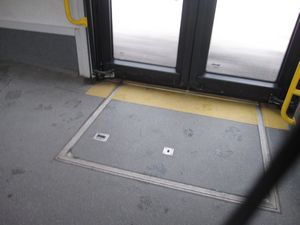 |
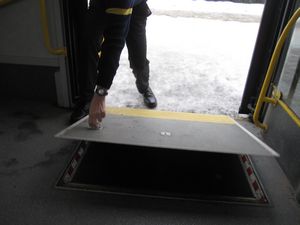 |
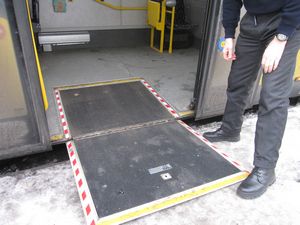 |
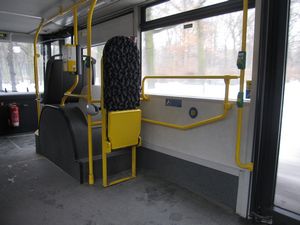 |
Taxis
Taxis in Berlin generally aren’t too expensive because the tourist sights aren’t very far from each other. They are most useful for moving between areas where there are tourist sights: Checkpoint Charlie to Museum Island, Gemäldegalerie to Gendarmenmarkt, the Jewish Museum to the Reichstag, etc…
If you are going from the former East Berlin to the former West Berlin, consider using the cheaper, more accessible, and equally convenient bus routes number 100 and 200.
I am not aware of any taxi companies with accessible vans but am currently looking into it.
Taxi-Ruf Würfelfunk “0800-Cabcall” AG +49 (0)800 – 222 22 55
Quality Taxi +49 (0)800 – 26 30000
Funk Taxi Berlin +49 (0)30 – 26 10 26
TaxiFunk Berlin GmbH +49 (0)30 – 44 33 22
More information can be found at the association for Berlin taxis
Subway/Metro (also known as the U-bahn)
There are 77 accessible stations in Berlin which make it a good option for wheelchair travel in Berlin. An elevator will get you from street level to the platform level.
S and U-bahn map (.pdf)
(in German). You can also call 49 (0)30 256-22 096
Interactive map showing where subway elevators are out of service
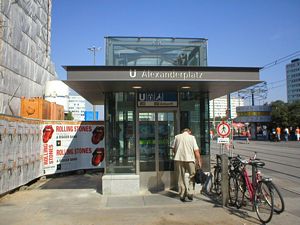 |
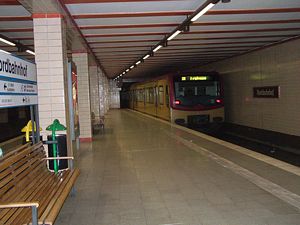 |
http://www.amel.gr/index.php?id=54&no_cache=1&L=1#print Metro Map
http://www.oasa.gr/index.asp?tml=1&pageid=116&menu=2&pg=1 Public Transportation Maps
Train (also known as the S-bahn)
The S-bahn is the above ground train in Berlin. Most of the network is not useful for tourists with the exception being a single east-west line that connects a few of the tourist sights. This line connects Zoologischer Garten (former West Berlin), the Hauptbahnhof (main train station), Friedrichstrasse, Hackescher Markt, Alexanderplatz (former East Berlin near the TV Tower), and Ostbahnhof.
S and U-bahn map (.pdf)
Station accessibility information from www.s-bahn-berlin.de
Tram
The trams run almost exclusively north and east of the TV Tower at Alexanderplatz which makes them not very useful for visiting the tourist sights. Sixteen of the twenty-two tram lines have accessible trams
Tram map (.pdf)
Tram details (in German) from www.bvg.de
Accessible Car Rental
Because of the extensive accessible public transportation system in Berlin, it’s not necessary to rent a car (and parking can be difficult to find and expensive). If you are looking for a car with hand controls or a ramp, I would start here:
Additional Resources on Getting Around Berlin
Transportation page on visitberlin.de
www.fahrinfo-berlin.de – Can search for accessible public transportation routes (in German). Not very easy to use.
www.bvg.de – Can download “Accessible flyer” (or Flyer Barrierefrei) on the right side of the page which contains accessible public transportation information (mainly in German)
Read more:
Berlin Accessible Travel – main page
Pros and Cons of Berlin Disabled Access
8 Wheelchair Accessible Travel Tips for Berlin Germany
8 Keys to Success for Berlin Disabled Travel
Handicapped Access at the German History Museum
Berlin Wall Wheelchair Access
Disabled Access at Museum of the Wall at Checkpoint Charlie
Wheelchair Access at the Reichstag
German Resistance Memorial Handicapped Access
Travel Insurance for Disabled Travelers
Berlin Trip Planning by Sage Traveling – Travel with Ease!


